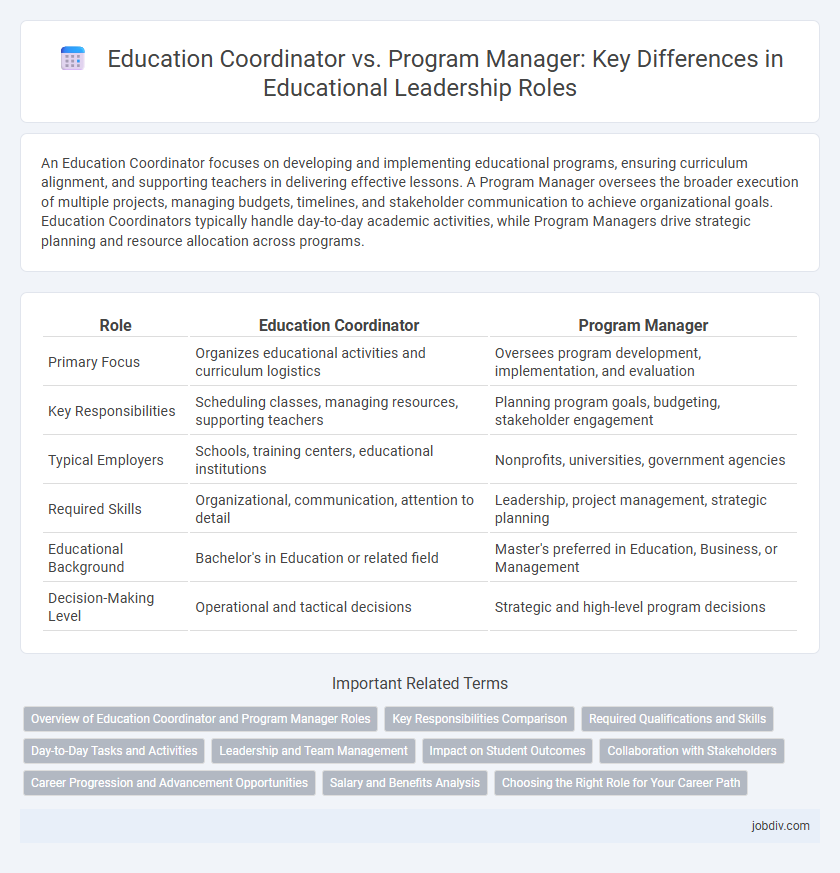An Education Coordinator focuses on developing and implementing educational programs, ensuring curriculum alignment, and supporting teachers in delivering effective lessons. A Program Manager oversees the broader execution of multiple projects, managing budgets, timelines, and stakeholder communication to achieve organizational goals. Education Coordinators typically handle day-to-day academic activities, while Program Managers drive strategic planning and resource allocation across programs.
Table of Comparison
| Role | Education Coordinator | Program Manager |
|---|---|---|
| Primary Focus | Organizes educational activities and curriculum logistics | Oversees program development, implementation, and evaluation |
| Key Responsibilities | Scheduling classes, managing resources, supporting teachers | Planning program goals, budgeting, stakeholder engagement |
| Typical Employers | Schools, training centers, educational institutions | Nonprofits, universities, government agencies |
| Required Skills | Organizational, communication, attention to detail | Leadership, project management, strategic planning |
| Educational Background | Bachelor's in Education or related field | Master's preferred in Education, Business, or Management |
| Decision-Making Level | Operational and tactical decisions | Strategic and high-level program decisions |
Overview of Education Coordinator and Program Manager Roles
Education Coordinators primarily oversee the organization and implementation of educational programs, ensuring alignment with curriculum standards and student needs, while managing staff coordination and resource allocation. Program Managers focus on strategic planning, development, and evaluation of educational initiatives, often overseeing multiple projects and budgets to achieve long-term institutional goals. Both roles require strong leadership, communication, and organizational skills but differ in scope, with Coordinators handling operational tasks and Managers driving overall program effectiveness.
Key Responsibilities Comparison
Education Coordinators primarily focus on organizing curriculum delivery, tracking student progress, and facilitating communication between teachers and administration to ensure educational standards are met. Program Managers oversee the broader scope of educational initiatives, including budgeting, strategic planning, stakeholder engagement, and evaluating program effectiveness across multiple projects. While Education Coordinators handle day-to-day academic logistics, Program Managers are responsible for aligning educational programs with institutional goals and securing resources for sustainable program development.
Required Qualifications and Skills
Education Coordinators typically require a bachelor's degree in education or a related field, strong organizational skills, and experience in curriculum development and student engagement. Program Managers often need advanced degrees such as a master's in education administration or project management, demonstrated leadership abilities, and proficiency in budgeting and strategic planning. Both roles demand excellent communication skills, but Program Managers usually require greater expertise in managing multi-faceted programs and cross-functional teams.
Day-to-Day Tasks and Activities
Education Coordinators primarily manage daily administrative tasks such as scheduling classes, coordinating with instructors, and monitoring student progress to ensure smooth program delivery. Program Managers oversee broader responsibilities including curriculum development, staff supervision, budget management, and strategic planning to align educational initiatives with organizational goals. Both roles require strong communication and project management skills, but Education Coordinators focus more on operational execution while Program Managers emphasize leadership and program growth.
Leadership and Team Management
Education Coordinators focus on overseeing curriculum development and ensuring instructional quality, while Program Managers lead broader educational initiatives, managing resources and strategic planning. Leadership in Education Coordination involves direct support and mentoring of teaching staff, emphasizing classroom impact and educational outcomes. Program Managers exercise higher-level team management, coordinating cross-functional teams to align program goals with organizational objectives and drive large-scale educational success.
Impact on Student Outcomes
An Education Coordinator directly influences student outcomes by designing and implementing curriculum strategies tailored to diverse learning needs, ensuring alignment with educational standards. Program Managers oversee multiple educational initiatives, optimizing resource allocation and program efficiency, which indirectly enhances student performance through systemic improvements. Both roles collaboratively drive measurable improvements in academic achievement and student engagement by addressing different aspects of educational program delivery.
Collaboration with Stakeholders
Education Coordinators facilitate communication among teachers, parents, and administrative staff to ensure alignment with educational goals. Program Managers oversee collaborations with external partners, such as community organizations and funding agencies, to secure resources and support program implementation. Both roles emphasize stakeholder engagement but differ in scope, with Education Coordinators focusing on internal collaboration and Program Managers managing broader, cross-organizational partnerships.
Career Progression and Advancement Opportunities
Education Coordinators typically manage day-to-day operations and assist with curriculum implementation, serving as a foundational role that builds essential organizational and communication skills. Program Managers oversee multiple projects or programs, requiring strategic planning and leadership capabilities that position them for senior administrative roles or specialization in educational program development. Career progression often involves moving from coordination roles to program management, with advancement opportunities expanding into director-level positions or educational consulting.
Salary and Benefits Analysis
An Education Coordinator typically earns a salary ranging from $45,000 to $65,000 annually, with benefits often including health insurance, retirement plans, and professional development opportunities. In comparison, a Program Manager in education commands a higher salary, generally between $60,000 and $90,000, reflecting greater responsibilities such as budgeting and staff oversight, along with enhanced benefits like performance bonuses and expanded healthcare options. Salary disparities between these roles correspond to differences in scope, with Program Managers frequently receiving more comprehensive compensation packages aligned with leadership and project management duties.
Choosing the Right Role for Your Career Path
Education Coordinators oversee curriculum development and facilitate communication between educators and administrators, ensuring program alignment with educational standards. Program Managers handle the strategic planning, budgeting, and overall execution of educational initiatives, often managing multiple projects simultaneously. Selecting the right role depends on your strengths: opt for Education Coordinator if you excel in collaboration and curriculum design, or choose Program Manager if you prefer leadership in budgeting, planning, and project management.
Education Coordinator vs Program Manager Infographic

 jobdiv.com
jobdiv.com